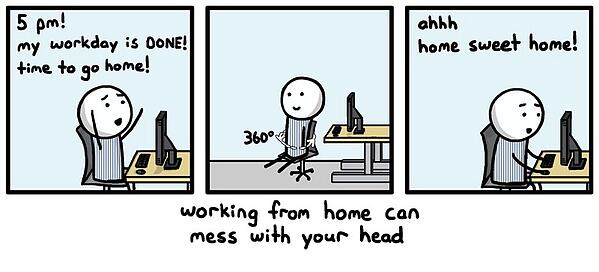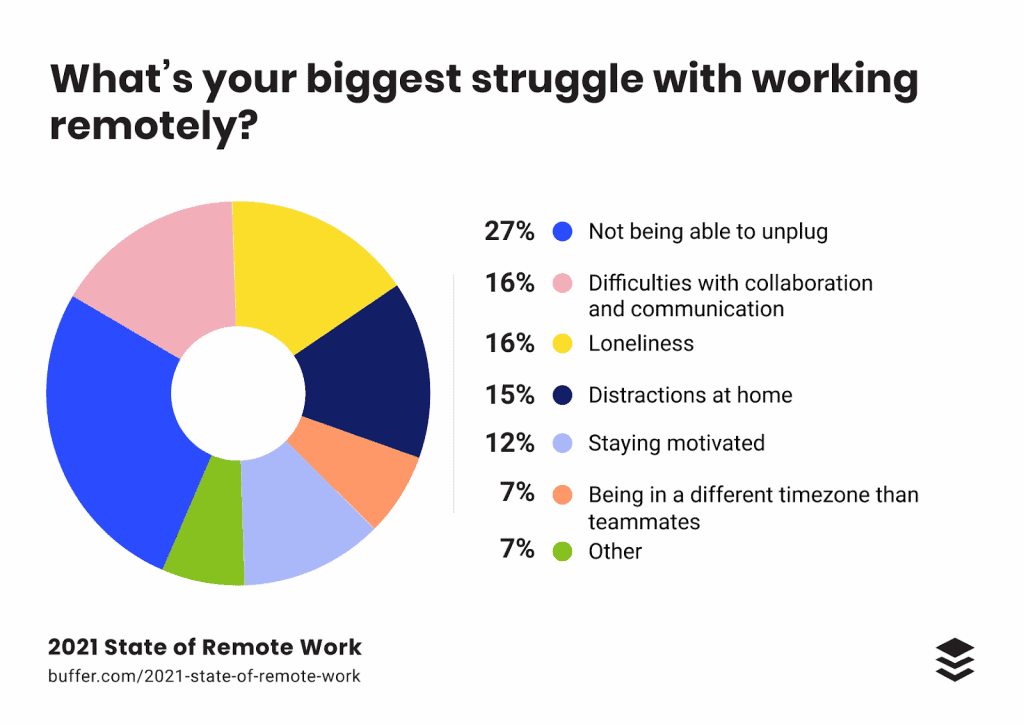97.5%. That's how many people in Buffer's 2021 State of Remote Work report would like to work remotely - at least some of the time - for the rest of their careers.
And that's understandable. If the COVID-19 crisis has taught us anything, it's that money of us can do our job quite well while having the flexibility to choose where we work.
It seems many companies are adapting to this. According to a PwC study from last January, many companies are ready to give partially remote management a shot, despite mixed feelings about it:

However, what we haven't thought about, is what happens when some people decide to work remotely and some come into the office.
How can you ensure everyone is treated equally in that scenario? How can you make your team members feel connected if some of them can't have water cooler discussions? What else do you need to think about to make hybrid teams work?
In today's post, we give you questions that you should ask your team to help you better navigate the challenges of hybrid teams. We'll show you how to avoid having your distributed team members feel like second-class citizens, and work through common issues faced by mixed location teams.
41 remote management questions you should ask to support your hybrid team
A big part of successful remote management is to be adaptable. Things that worked for your in person team, won't always work for a remote team.
The same is true when you shift to hybrid teams; you have to adapt to a mixed environment that has its own challenges. Fortunately, we're here to help you today.
There are several areas you need to ask your team about and focus on if you want to nurture a happy, productive hybrid team. They are:
- Burnout and unplugging
- Information inequality
- Feelings of isolation and a lack of social connections
- Working asynchronously in a way that doesn't slow down/block anyone's work
- Career growth
You'll need some time to explore these questions with your team. Plan to ask multiple of them in a category, or a series of followup questions to truly understand there perspective.
Of course, you may wonder when you have time for this? This exactly what great 1 on 1s are all about. Plan to ask these in those meetings, so that you have a private, extended period of time to talk about problems and solutions with each of your team members.

Hybrid team questions about balance, connection, and unplugging
One of the main reasons many like to work remotely is the flexibility to choose when and how you work.
With COVID leading to so many not just working remotely, but working from home, the dynamics of work have changed. Rather than punching a strict clock, 9 to 5, many have found themselves working longer and different hours.
Taking a break mid-day is more feasible, and many laptops have opened up for late-night shifts and second focus sessions where no Zoom calls are scheduled.
But the work schedule isn't the only change.
In Buffer's 2020 report, loneliness was cited as the biggest issue plaguing remote workers. However, that's changed in 2021, as not being able to unplug is by far the biggest challenge for distributed employees.

Unlike their in-office counterparts, unless your remote team members are extremely disciplined, they probably won't have a clearly defined schedule, routines, and breaks. That's what can make it so difficult for them to separate work from their free time, struggling with productivity, motivation, and energy levels.
And this doesn't even consider any distractions or complicating factors they may be facing working from home or another non-office location (i.e.- children in virtual school, tight quarters with a working spouse, internet issues, etc).
To make sure your team avoids these issues, ask questions like:
- How is your work-life balance right now? What would you like to change about it?
- How do you feel your energy levels are at work right now: strong and motivated, okay, or feeling kind of run down or burnt out?
- How much time are you setting aside for yourself each day?
- How have your routines changed since you shifted from office work to working remotely? What's worked better? What do you want to change?
- How often do you take breaks during work? What helps you recharge when you do?
- Do you have anything coming up that may affect your usual schedule that would help better manage my and the team's expectations?
- How is your remote work space setup going for you? Can you focus effectively and comfortably there?
- What routines or habits of yours help you be at your best and work sustainably? (picking up kids, workout routine, a key hobby or event, personal need - aka Their Rhythm)
Help people find their rhythm
Marissa Mayer, former CEO of Yahoo, learned the importance of learning your team's daily habits and helping them optimize work around that. As she puts it:
"I tell people: Find your rhythm.
Your rhythm is what matters to you so much that when you miss it you're resentful of your work.
When you mess with your team's rhythm because you asked them to come in on their day off, do extra hours without any prior announcement, or cause them to miss something really important to them personally, it's only a matter of time before they start resenting you for it."
By finding their rhythm, people will find it easier to separate work from free time, know when they're most productive and how to prioritize their tasks.
With the shift to remote work, and the many changes COVID has brought to everyone's lives, it's quite possible the rhythm for many on your team has changed. Even if you knew before what was most important to them, it's a good idea to check in and see if it changed, whether they're in the office or remote now.
If you want more in-depth advice on how to help your employees structure their day and unplug, you can start by reading these articles:
- Avoiding Employee Burnout: How to Help You & Your Team Thrive in Quarantine
- 3 Crucial Keys to Helping Your Team Transition to Remote Work Effectively
- Team building questions for remote workers
- 5 Things You Didn't Expect When Managing Remote Teams in COVID (and what to do about it)

Hybrid Team Questions about information inequality
Water Cooler discussions, company announcements, random hallway conversations; These are the things your remote team members will be missing out on since they don't share an office with the rest of your team.
Especially if there are just a few of them, it's easy to forget what they don't know about what's going on at the company.
They're also more likely to have issues with team chemistry and getting the same information the rest of your team has access to thanks to sharing the same physical space. You really don't appreciate all the little things you overhear and quick side conversations until you miss them, or start recognizing who was not around for any of them.
To counter these problems, you can ask your team the following questions:
- Is there anything about the team/company you'd like to know?
- What are some things you feel you need to catch up on?
- What, if any, recent updates came as a surprise to you?
- What ideas do you have for better keeping you in the loop?
- Do you feel like you find out about changes and key information early, just the right time, or too late? Why?
- Do you feel included in conversations on the team that you need to be? What is a recent examples where you felt left out of something important?
These questions will help you recognize if there's an issue and start a discussion on how to deal with it.
And to avoid these from happening in the first place, build these habits to ensure they're not missing out on any vital information:
- If you hear something they should know, either loop them in right away, or share it with them later. A quick note, call, email, or chat message can make a really big difference and keep your communication debt low.
- Use your one on ones to fill them in on the things they haven't heard and answer all their questions. This is a great, regular stopgap to help your remote team members out before communication debt becomes too great.
- Build inclusive habits by encouraging your team to have video calls with everyone that needs to be a part of a discussion whenever possible, even if some of them are in person heading to a white board. Adding a remote person to a call can make a big difference for their engagement and participation.
Building a great support system and healthy communication for your hybrid remote team doesn't happen by accident. Plan ahead, and ask direct questions about the issue to identify the areas you need to work on most.
For more ways to help your remote team members deal with information inequality, check out this link:

Hybrid team questions about social disconnect
Unfortunately, your remote team members can't share a meal with their colleagues, or go out for drinks with them after work. Over time, this can lead to feelings of isolation and make your people feel like they don't know each other that well.
As we noted in the section about unplugging, loneliness was the number 1 issue for remote workers in 2020, and it's the second most common one in 2021.
Being socially excluded will gradually lead to your remote team members feeling alienated and impact their well being. Your in office team members will also likely start to defer to those near them instead of the best person on your team (who may be remote).
To prevent this disconnect from happening, you need to ask the following questions and act on the answers you receive to maintain team chemistry:
- Which of your team members do you get along with the best?
- Which team members do you feel like you don't know well?
- What could we do to improve or increase team collaboration?
- Do you feel that remote and in office team members are equally included? Why or why not?
- How could we better bring together remote and in office team members?
- What is an example of a recent time you felt disconnected from the team or specific peers? What impact did that have?
- What activities would you enjoy doing with your team outside of work?
- Do you feel like you have good relationships with your fellow team members? Which ones could be improved?
- How could we improve the connection between team members that are not in the same location?
Ensuring remote team members build rapport with everyone can make all the difference in how well your team functions. That's why you should work to create opportunities for everyone to socialize, no matter where they're working from. This can include retreats and flying in remote staff, as well as doing remote bonding.
Things your entire team can do to build a better connection, even remotely
Here are some activities you can try to ensure everyone on your team can build rapport with each other:
- Open meetings with bonding/ice-breaker questions
- Play pub-style team trivia together
- Try remote-friendly games (Among Us, Codenames, etc)
- Virtual escape rooms
- Have employees take turns giving tours of their hometowns
For more ideas on what your partially hybrid team could do together, check out this tweet and the many replies with ideas.

Hybrid team questions about working asynchronously effectively
With in-office team members, it's easy to ask questions and solve problems on the spot. Unlike them, remote team members will sometimes be thousands of miles (and a few time zones) away.
This means they could be asleep while you're in the middle of your workday or vice-versa. It could also mean you'll have to wait on things such as feedback, removing blockers, or anything else you wanted to address immediately.
Delayed communication is costly, which is why practicing asynchronous communication is an absolute must if you want to make partially remote teams work.
To create a good foundation for asynchronous communication between you and your team, you can ask them the following questions:
- When are you usually offline/online?
- What times do you like to catch up on messages and documents?
- Are you more of an early bird or a night owl? How does that impact your productivity and focus?
- What's the best way to reach you if there's a task we need your help with urgently outside of your typical hours?
- How often do you feel blocked by not having things you need to do your work because of anyone else on the team? Let's talk about an example.
- How do you feel we're doing with our tools for asynchronous communication?
- Where do you think we're doing a good job communicating asynchronously as a team?
- Where are we struggling with asynchronous communication? How could we improve it?
- Do you feel like you're good enough at expressing your thoughts in written form? Would you like help improving?
As you discuss these questions, listen for examples and the root cause of problems. Sometimes you may need to switch an asynchronous process to be a live meeting, and other times "This meeting could have been an email” will be staring you right in the face.
Regardless of what you hear, the key is action. If you ask everyone on your team these kinds of questions, you're likely to hear common patterns of problems and opportunities to improve. Take action on those and you'll see your team (both in office and remote) operate faster and better.
Ways to get better at asynchronous communication
Doist founder Amir Salihefendić has several great tips for becoming a better asynchronous communicator, including:
- Promote writing and communication as core skills to master. This will reduce the need to have as many live meetings, and help reduce the number of misunderstandings that can happen in written vs. live communication. (Here's a post that can help you improve your and your team's writing skills.)
- If you're stuck in a meeting or a conversation that is going nowhere, ask people to write in a thread or a document instead.
- Teach people how to spend time productivity while waiting for an answer. With partially remote teams, there will sometimes be blocks and delays you can't solve. This isn't a huge problem, as long as your team finds something else valuable to do.
- Give people time to consider something and set reasonable deadlines on when you expect an answer (i.e.- "I want to finish this in 2 days and would love your input" instead of "I want your feedback in the next hour.")
- Use tools that promote deep work and async communication (e.g., Github pull requests, Basecamp for project management, Google docs for notes and collaboration, etc). Real-time communication promotes an ASAP culture and fear of missing out as people need to be online when the conversation happens, so other tools should supplement chat apps.
- Have communication channels for emergencies. You can get a paid team subscription on Slack or Teams or go with free options such as Telegram or Whatsapp. In either way, once you ping your team in real-time using these tools, they'll know it's urgent versus so many other pings that can wait.
If you need tips on how to set up more intentional processes to support remote team members and get better at asynchronous communications, check out this post:

Hybrid team questions about growth
Countless studies have shown career growth is one of the most powerful motivators for employees everywhere. Unfortunately, most employees don't get the growth they desire, and this is especially true for your remote workers.
It's so easy to forget to take the time to have that conversation with someone you don't see regularly, and not have them as top of mind for key projects and career opportunities.
To make sure that never happens, bring up their career goals every 4-5 one on one meetings. As part of that, check in on the progress all your people are making, and be sure you remember to do this for your remote team members.
You can ask them questions like:
- What skill would you like to work on most right now?
- How do you best learn? What's worked for you to pick up new skills in the past?
- What ideas do you have for improving your skills?
- What courses, trainings, books, mentors, coaches, or other resources do you think would help you with your growth goals?
- Do you feel supported in your growth here? If not, why? What steps do you think we could take to improve that together?
- Do you feel you are making progress on your goals?
- What is the biggest hurdle for you right now in your growth? How could we fix that?
- What projects would you like to take part in? What is appealing or interesting about them to you?
Your one on ones are the best time to ask these questions. Once you've established what their goal is, make a plan for how they can make progress over time. Then, one on ones become a place where it's easy to spend a few minutes checking in, updating goals, and talking about progress on things that may not happen for a year or two.

For more resources on how to help your team develop, check out these links:
- How to Help Your Team Achieve Their Goals
- How Employees Can Drive Their Own Career Growth
- How to Grow Your Employees when You Can't Promote Them

Conclusion
Partially remote management is a very unique challenge. In many ways you have the worst of both worlds; you have to be conscious of how each person on your team is affected by others, but you can't always see everyone. And any tactics that worked in the office, or for the remote team members, may not work for the opposite person.
Pay extra attention to the areas we've mentioned in this post so everyone feels included, respected, and motivated to do their job, no matter where they're working from. You'll find that there's challenges to work through to find the optimal balance between tactics that work in office teams and remote ones.
As a reminder, these include:
- Unplugging – we've all experienced it: it's very difficult to draw a line between work and free time while working remotely. People who have issues with unplugging are at serious risk of experiencing burnout, so make sure to address that in your 1:1s and learn what helps them unwind.
- Information inequality – be mindful of the fact remote team members can't participate in conversations across the office, so think about what they're missing out on and keep them in the loop in your 1:1s.
- Social disconnect – remote workers don't have the option of hanging out with their team after work, going out for drinks, or sharing a meal with them. To make them feel more connected, try to think of activities everyone can participate in and organize quarterly/monthly team-building events.
- Working asynchronously – with an in-office team, people have the same schedule and very similar routines. With distributed team members, especially ones working in different time zones, there are time differences you need to account for. Look for ways to embrace asynchronous communication to replace meetings that are time consuming, or hard to coordinate across time zones.
- Lack of growth – career growth is the #1 motivator for people around the world, regardless of whether they're working remotely or not. Despite that, it's so easy to forget it with your distributed team members due to less visibility. Be prepared to bring up their goals in your 1:1s regularly to keep them motivated, and ensure they know what career opportunities are available to them at your company.
Leading hybrid teams requires ongoing effort and awareness. To help your remote team members thrive and feel a sense of belonging, make sure to have regular 1:1s with them. Use today's questions to learn about their ambitions, frustrations, and help them stay in the loop.
Are you growing as a leader? Are you building the skills you need?
Whether your team is in office with you or remote, Lighthouse Lessons can teach you the skills you need to better lead, motivate, and grow your team. Let us help you navigate the unique challenges of being a leader like we helped Daniel by learning more and signing up here.





